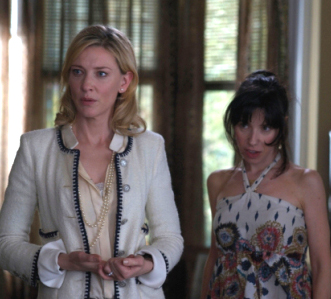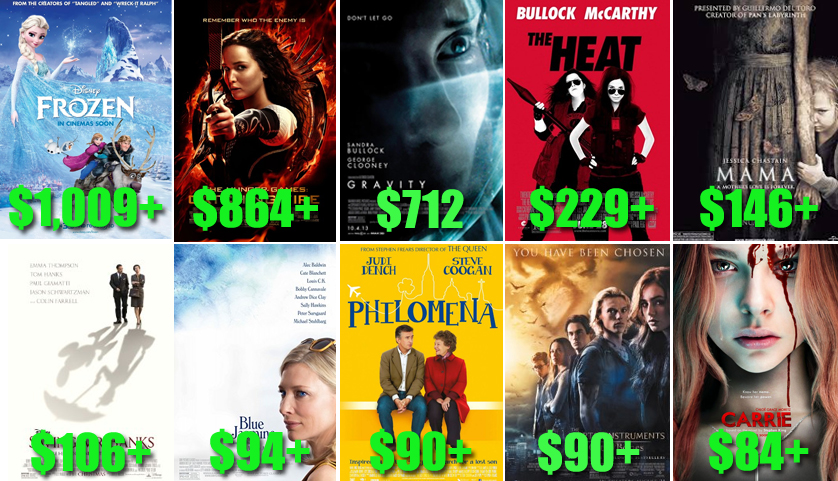 Blue Jasmine was one of Woody Allen's biggest hits, earning $94 million globallyGeena Davis and I have been harping on gender disparity in film for ever and I've also spent a lot of time on its sister problem: ageism focused on women. But in the past couple of years it feels like the conversation has finally reached the mainstream.
Blue Jasmine was one of Woody Allen's biggest hits, earning $94 million globallyGeena Davis and I have been harping on gender disparity in film for ever and I've also spent a lot of time on its sister problem: ageism focused on women. But in the past couple of years it feels like the conversation has finally reached the mainstream.
Every website, even the most misogynist-friendly, now knows what the Bechdel Test is and that the majority of movies still fail it even though it's super easy to pass. Cate Blanchett's Oscar speech got a lot of attention and Kevin B Lee recently had a major cinemetrics piece in the New York Times about women's limited screen time and now, as The Wrap reports, a new study out of San Diego State's Center for the Study of Women in Television and Film shows how bad the problem is not just in lead roles (only 13% of the films in the top 100 of last year) but in ageist double standards (women over 40 account for only 30% of female roles while 55% of male roles are for the over 40 set) and in racial representation (73% of all female roles are for caucasian women).
All of this despite the fact that Cate's Oscar speech was total righteous truth-telling. [More...]
 the ten biggest global hits led by women this past year (figures in millions). I thought The Call would be on this list but it was only a big hit in America.
the ten biggest global hits led by women this past year (figures in millions). I thought The Call would be on this list but it was only a big hit in America.
...and perhaps those of us in the industry who are still foolishly clinging to the idea that female films with women at the center are niche experiences. They are not. Audiences want to see them and, in fact, they earn money.
But can Hollywood course correct?
I think the problem is so ingrained that even people who don't notice they're doing it preference male-centric narratives above female ones. This tweet from Michael Cusumano reminded me of how unconcious it is for everyone. Including even me (gulp).
True Detective withdrawal? Why not catch up with Top of the Lake which is actually a superior example of the atmospheric crime miniseries.
— Michael Cusumano (@SeriousFilm) March 11, 2014
Jane Campion's Top of the Lake, a bracing feminist work shares several themes and concerns and elements with True Detective: child abuse, missing children, pedophilia, evil secretive patriarchal societies, detectives with relationship issues, locale as character, fervent religiosity, and award-worthy acting among them. But Top of the Lake is an even stronger work with a less plotholey mystery, just as much eery resonance, an even more distinct auteurial voice, and a more satisfying but still shocking closer. But did it excite the internet in the same way? No way. I didn't even really write about it here and yet I found the time to say words about True Detective.
Despite the once frequent complaints that Oscars don't accurately represent current cinema well (an argument which reached its apex during the Aughts), I've always thought they do in several ways. But in one way they don't. THANK GOD. See, in some ways the very structure of the Oscars with their four gender balanced acting categories forces the industry to be less sexist than they would be otherwise; if they ever dropped gender as a qualifications for acting categories, I'd bet the farm that more men would be nominated every year than women due to systematic and deeply ingrained sexism.
It's a bit of a tangent, though not entirely since ageism and sexism are often fused, but here's an old graph I did in 2010 illustrating Oscar's age problem across its then 82 year history...

(It's entirely speculative but I'd bet that a 'by gender' graph if you didn't have divided categories would most closely resemble the far right graph with women only getting a sliver of the honors.)
The past four sets of winners since I made that chart haven't really moved the needle. Men are still most likely to win, in either category, during their 40s as McConaughey and Leto both did this year while women's peak Oscar years are still the 20s through early 30s as recent wins by Lawrence, Nyong'o, Hathaway, and Portman remind us... though thankfully supporting actress gives women in their 40s a fairly fair shake). More on this topic surely next Oscar season as it nearly always applies.
But surely there are reasons enough to hope. Do you think things are changing? This past year famous gave us the oldest ever Best Actress shortlist and the number of bankable women over 60 is currently surprisingly large. The way I see it we have 3 currently: Mirren, Streep, Dench... which is quite a lot more than we used to have if you think about it. Sandra Bullock, about to hit 50, is miraculously even more bankable than she was in her 30s... and she was pretty bankable back then.
And even if change will take a long while perhaps the currently hot YA craze, which often focuses on young women, will eventually lead to more gender balance in the movies since money talks. Or are they part of the problem... given their intense focus on youth?